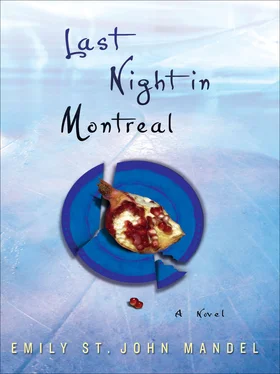Simon told no one; he’d always known exactly why his sister had gone away.
He hung up the phone, pressed *69, and wrote down the number on the palm of his hand. But before that he stayed on the line for a long time, listening to static and the desert wind.
The phone records for Lilia’s mother’s house arrived on Christopher’s desk once a month in a thick envelope, and a couple of years after he’d taken the case he could skim through the pages quickly; he knew most of the numbers by heart. The dentist, the psychiatrist, her first husband’s house where her son lived most of the time, her son’s friends in St.-Jean when he was visiting her on the weekends — and here he stopped cold at an incoming call from a foreign telephone number. The duration of the call had been a little over an hour. He dialed the number and listened to the endless ringing. No one picked up. He wrote, Pay phone? in the lower margin and within an hour had confirmed his suspicion.
“Only a week,” he told his wife that evening. They sat on opposite sides of the bed, formally, like lovers at the calm ending of a motel-room affair.
“A week,” she repeated tonelessly. He’d never left her alone before.
“It could be a breakthrough,” he said. “I spoke to the girl’s mother, and she knew nothing; she said she was out that night. I asked if I might speak to her son, and she reminded me of the terms of her contract and then hung up on me. I think Lilia’s brother could easily have spoken to one of them, the girl or her father, but if I can’t talk to him, I have to just. . listen, you know I hate leaving you alone.”
She smiled suddenly, insincerely it seemed to him, and said, “Well. I hope you have a lovely time.”
“It’s work,” he said. “Not a vacation. I’m just going to fly down for a week and rent a car and try to find this kid. It’s a hell of a long shot.”
“Well, try to have a lovely time anyway.”
“Thank you,” he said awkwardly. “Thank you, I’ll try.”
In Arizona he stood before the pay phone in the noonday sun; he could almost see her there in front of him, a ghost, a mirage, dialing a number dredged up from some recess of childhood memory. He turned back toward the motel. It was the middle of the afternoon, and the parking lot was silent. Two cars and an eighteen-wheeler shimmered in the heat. He stood facing the motel until he saw what he was looking for: a movement of white on the upstairs balcony, a chambermaid pushing her cart between rooms. He was walking across the expanse of parking lot when she disappeared into a dim open doorway, the door a rectangle of shadow in the brilliant light. He tried to walk loudly on the balcony so she wouldn’t be startled by anyone sneaking up behind her, but she still jumped and pressed a hand briefly to her chest when he knocked on the door of the room she was cleaning.
“I apologize for disturbing you,” he said. “Christopher Gray-don. I’m a private investigator.”
She smiled and told him a name that he wrote illegibly in his notebook. The chambermaid had lived all her life in the town of Leonard. In the long hot afternoon after the interview had aired, she had been vacuuming the abandoned room. She’d found the key in the door that morning. She hadn’t seen the Unsolved Cases episode, but she had noticed the Bible; she’d picked it up from the bed where it had been discarded, more out of an instinct for tidiness than out of any kind of religious curiosity, and noticed the note written across the page. She’d read it through a couple of times, frowning. There was something a little creepy about it, and she’d suddenly felt like she was being watched and the silence in the room was oppressive, so she’d closed the Bible quickly and put it back in the drawer. She hadn’t thought of it again until Christopher appeared in the doorway of a room she was cleaning two weeks later.
“This will sound like a very strange request,” he said after he introduced himself, “but I wonder if you might remember. .”
The chambermaid had always wanted to be famous. And she was, very briefly: “Local Tip Brings Breakthrough in Missing Girl Case” ( Leonard Gazette, issue number 486), and she smiled beneath the caption with resplendently bleached hair and hoop earrings. “I didn’t think nothing of it,” she told the newspaper reporter, who changed nothing to anything before the story went to press. “Just that it was kind of weird, you know, to write something in a Bible like that, but then a detective came to see me.”
He rented a car and spent six weeks driving, tracing wider and wider circles around the town of Leonard, stopping at motels, asking questions, pulling over to close his eyes and try to imagine which way they might have gone. He called Peter, who told him to stay down there as long as he needed to; his other cases could wait. He called his wife on two consecutive evenings but got only the answering machine and so gave up trying to reach her and continued driving. On the flight home from Tempe he held the new Bible open on his lap, his eyes falling back to the message when he wasn’t staring out the window. It sent a shiver up his spine every time he looked at it. The handwriting was scrawled and uneven. She was writing fast. I am not missing. Stop searching for me. I want to stay with my father. Stop searching for me. Leave me alone. — Lilia.
She had written stop searching for me twice. He thought she must have just seen the Unsolved Cases episode, or perhaps she’d been watching it as she wrote; he imagined her writing from the edge of panic, her image flashing across the screen. She understood that she was being pursued. Her strain, telegraphed back to him through this latest message, seemed to Christopher like an acknowledgment of his existence; after two years of pursuit she had received the message that he was following her, opened a Bible to the Sixty-ninth Psalm, and written a reply. He imagined that she was speaking to him. He arrived back in Montreal in the early afternoon, and went directly from the airport to the office instead of going home. He stared at the photograph in her file, the first grade school portrait that had been used on Unsolved Cases, and caught himself whispering the same words over and over again, looking into her inscrutable eyes: Where do you go? Where do you go? He felt he’d never been so close.
MICHAELA’S MOTHER began smoking in her husband’s absence but neglected to purchase ashtrays. When Christopher came home the house had a strange, burnt smell about it; there were cigarette burns here and there on the furniture. He would have thought himself to be the kind of man who draws the line somewhere, but he found it no easier to talk to her about putting out cigarettes on the furniture than about strange ties and cheap cufflinks. He purchased a number of cheap glass ashtrays and left them here and there throughout the house. He began going to the office before sunrise, and he didn’t come home before dark. He slept with his secretary occasionally, but his heart wasn’t really in it. Michaela carefully collected perfect grades, attended the circus school in the afternoons, and began walking home from the bus stop as slowly as she possibly could.
Michaela’s mother was losing interest in domesticity. It was hard to think of it in any other way; she had attended a parent-teacher conference some months earlier and had announced that it was her last; if the school required parental involvement, she said, it wouldn’t kill Michaela’s father to take a couple hours off work. She was no longer cleaning the house; the rooms gathered dust until Christopher quietly hired a once-a-month cleaning lady. Sometime after this, she stopped cooking; her expensive set of copper pans collected dust in the kitchen, and her library of cookbooks went unopened. She brought in Chinese takeout or deli sandwiches and started buying disposable plates; they ate off Styrofoam with plastic forks. There were strange combinations: an enormous container of deli coleslaw with takeout sushi and a container of pickles. Pizza with fortune cookies. Small cartons of milk in lieu of glasses.
Читать дальше












